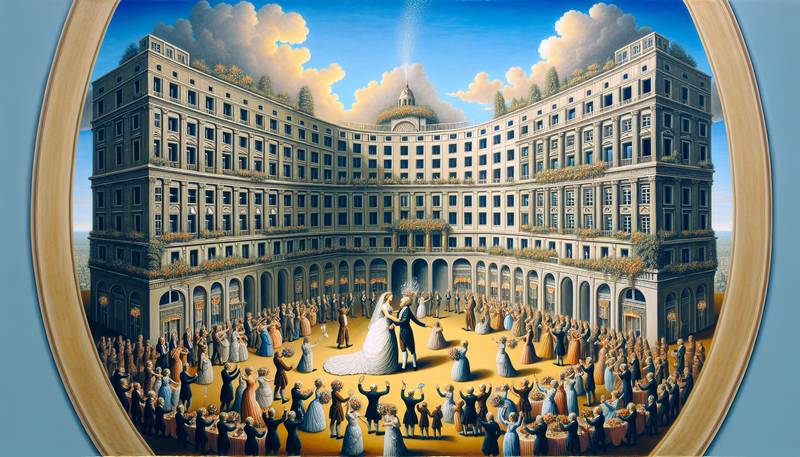Hotel Brand Consolidation: Analyzing Current Market Trends

An Unlikely Marriage: Mergers and AcquisitionsThere comes a time in every hotelier's life when they must face the grim reality of the hotel industry's ongoing metamorphosis. Mergers and acquisitions have become the hasty matrimony arranged by the matchmaker of corporate necessity, as hotel brands of all shapes and sizes tie the knot with one another. "For better or worse," they whisper into the ears of their shareholders, "till bankruptcy do us part."The Bottleneck Battle Royale: Brand FatigueAs the hotel industry becomes more and more consolidated, an increasingly crowded marketplace has led to what industry insiders have dubbed "brand fatigue" - a weary, jaded malaise that has spread through the industry like a nasty case of bed bugs. With an ever-expanding roster of hotel brands to choose from, discerning travelers find themselves paralyzed by choice, desperately seeking unique hotel experiences that stand out from the homogenized mass.Hoteliers, meanwhile, are left to wrestle with the implications of this bottleneck battle royale, desperately seeking to differentiate themselves from the competition in increasingly desperate and outlandish ways. Enter the age of the "lifestyle brand," where hotels double as art galleries, fashion boutiques, and yoga studios, and where a continental breakfast is no longer sufficient to satiate the ravenous demands of the modern traveler.The Fine Line Between Differentiation and DesperationAs hotel brands clamor for attention in a marketplace that has become an equivalent of the Hunger Games, they must walk a fine line between differentiation and desperation. Many have turned to excessive gimmickry in an attempt to stand out from the crowd, but such tactics often result in a hotel experience that feels less like a chic boutique hideaway and more like the world's most expensive clown college. The key, it seems, is striking the right balance between offering a truly unique experience and not alienating guests with avant-garde absurdity.Where Hotel Brand Consolidation Has Gone WrongTake, for example, the ill-fated union of MegaHotels Inc. and LuxeLodging Corp, which resulted in a combined entity that bore all the hallmarks of Frankenstein's monster. An unwieldy mass of brands, each with its own idiosyncrasies and divergent target markets, the monstrosity quickly became a byword for corporate excess and dysfunction. Saddled with the ungainly task of managing the brood, the beleaguered company found itself unable to distinguish its many constituent parts from one another, resulting in a muddled and confusing brand identity that left guests cold.Then there was the much-publicized demise of HipsterHaven, a brand that prided itself on being the anti-hotel, offering a "counter-cultural" experience aimed squarely at the millennial traveler. Their approach was certainly novel: instead of beds, guests were offered artisanal hammocks; instead of room service, complimentary foraged nuts and berries. Alas, their differentiation strategy proved to be their undoing when it emerged that many guests failed to appreciate the subtle irony of paying exorbitant rates for the privilege of sleeping in what was essentially an overpriced treehouse.Learning from the Past: The Future of Hotel Brand ConsolidationSo, what can we learn from the colorful history of hotel brand consolidation? First and foremost, the importance of maintaining a clear and coherent brand identity cannot be overstated. In an increasingly competitive market, it is essential that hotel brands carve out a niche for themselves, offering a unique experience that sets them apart from the competition without straying too far into the realm of the ridiculous.Furthermore, hoteliers must recognize that they cannot be all things to all people. Attempting to cater to every possible demographic is a fool's errand, destined to confuse and alienate potential guests. Instead, hotel brands should embrace the unique qualities that set them apart from their competitors and focus on serving the specific needs of their target market.A Toast to the Happy Couple: Embracing Change in the Hotel IndustryAs the hotel industry continues to evolve and adapt to the demands of the modern traveler, it is inevitable that consolidation will remain a driving force behind the industry's metamorphosis. Like a happy couple exchanging vows, hotel brands must embrace the changes that come with such unions, recognizing that their marriage of convenience may well be the key to their survival in an increasingly competitive market.For better or worse, hotel brand consolidation is here to stay. The key to success lies in embracing the unique qualities that set a brand apart from its competitors, while avoiding the pitfalls of gimmickry and brand fatigue. Only then can hoteliers hope to weather the storm of change that is sweeping through the industry and emerge victorious, ready to get hitched once again in the great game of corporate matrimony.
|
|







